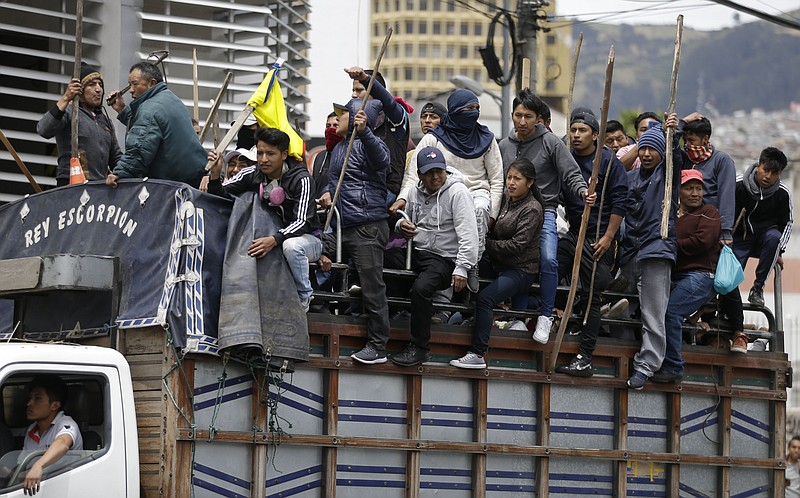QUITO, Ecuador (AP) — Thousands of indigenous people, some carrying long sticks, converged on Ecuador’s capital Tuesday as anti-government protests and clashes led the president to move his besieged administration out of Quito.
The South American country of 17 million appeared to be at a dangerous impasse, paralyzed by a lack of public transport and blockaded roads that were taking a toll on an already vulnerable economy.
Violence, which began last week when President Lenín Moreno’s decision to cut subsidies led to a sharp increase in fuel prices, has persisted for days. Several oil wells ceased production totaling 65,000 barrels daily because protesters seized installations, the energy ministry said.
On Monday, police abandoned an armored vehicle to protesters who set it on fire. Elsewhere, rioters smashed car windows, broke into shops and confronted security forces who fired tear gas to try to disperse swelling crowds.
Some video footage has shown police beating protesters on the ground. Opponents have accused Moreno’s government of human rights abuses in its attempts to quell disturbances.
On Tuesday, Moreno met Cabinet ministers in the port city of Guayaquil after moving government operations there from Quito because of security threats.
He said he had the support of Ecuador’s institutions and thanked them “for their defense of the democratic system.”
Moreno’s comments were broadcast by the Ecuavisa television network.
In a televised address late Monday, he said he was the target of a coup attempt, but would not back down from his decision to cut subsidies contributing to huge public debt that soared before he took office. The cuts were among measures announced as part of a $4.2 billion funding plan with the International Monetary Fund, which said the package will strengthen Ecuador’s economy and generate jobs.
Several military commanders in uniform stood behind Moreno during his address Monday, underscoring the armed forces’ support.
Moreno called for dialogue to resolve the crisis. At the same time, he said his leftist predecessor and former ally, Rafael Correa, is trying to destabilize Ecuador with the help of Venezuelan President Nicolás Maduro. Ecuador is among dozens of nations calling for Maduro’s ouster.
The Venezuelan government has not commented on Moreno’s allegation.
Correa and Moreno have traded allegations of corruption in recent months, and Correa says he and his allies are victims of political persecution. Correa, who has been living in Belgium, faces an arrest warrant issued last year in Ecuador for alleged corruption.
Venezuelan opposition leader Juan Guaidó echoed Moreno’s accusation, saying Maduro associates are trying to destabilize Ecuador.
Seven Latin American countries expressed support for Moreno’s efforts to restore order and denounced Maduro for allegedly trying to “destabilize our democracies.”
The nations signing the joint statement were Argentina, Brazil, Colombia, El Salvador, Guatemala, Peru and Paraguay. Colombia says Venezuela is providing refuge to Colombian guerrillas, an allegation that the Venezuelan government denies.
Colombia said it is suspending services at its diplomatic missions in neighboring Ecuador because of the unrest.
Some 570 people have been arrested in Ecuador for crimes including attacks on people as well as public and private property, according to Juan Sebastián Roldán, the president’s private secretary.
“What we’re going through is not a peaceful mobilization, it’s delinquency and vandalism,” Roldán said on Twitter.
The government last week declared a state of emergency, allowing it to curb some civil liberties as it tries to restore order.
The disturbances have spread from transport workers to students to indigenous demonstrators, an ominous turn for the government. Indigenous protesters played a major role in the 2005 resignation of Ecuador’s president at the time, Lucio Gutiérrez, though the military’s tacit approval was key to his removal.
The country’s biggest indigenous group, the Confederation of Indigenous Nationalities of Ecuador — which also had mounted protests against Correa — said Moreno’s government had failed to address protesters’ concerns and the welfare of Ecuador’s “most vulnerable” people.
“Troops and police who approach indigenous territories will be detained and subjected to indigenous justice,” the group said in a statement.

